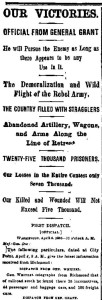![Union soldiers and band marching through a city street on their way to join the Civil War (Hartford, Ct. : Calhoun Show Print., [between 1880 and 1900]; LOC: LC-USZC4-1446)](https://www.bluegrayreview.com/wp-content/uploads/2015/04/3b52950r.jpg)
“Union soldiers and band marching through a city street on their way to join the Civil War” (library of Congress)
The federal occupation of Richmond allowed President Lincoln to see it 150 years ago today. The fall of Richmond also increased volunteer recruits in New York City because it was believed that becoming a Union soldier suddenly was much less likely to be a ‘covenant with death’. Also, the busier the Provost Marshal’s office could be kept with the extreme paperwork of signing up a volunteer, the less time they would have to enforce the draft.
From The New-York Times
THE DRAFT.; Recruiting Very Brisk A Fair Prospect of no more Drafting The Drawing Finished in the Twenty-first Ward. Drafted Men Twenty-first Ward.
The aspect of the drafting question, yesterday, was far less unpromising than on any previous day. The victories in Virginia induce a notion, by no means without reason, that enlistment now is much more like an engagement to take promenade in blue at a very fair rate of wages, and much less like a covenent with death than heretofore. The one year plan of the County Committee is also a good one, and largely economizes the funds. The subscriptions to the county loan continue to come in, though to be sure, not without some effort. The repayment from the State of bounty money, advanced by the county, is, if not formally agreed in, yet reasonably sure to be made within a few days. The efforts of the ward organizations are kept up with considerable effect.
In consequence of all these causes together, there was in fact no drafting whatever in the city yesterday, except to complete it in the Twenty-first Ward, where it had already begun. There was, moreover, a supply of money at the office of each of the District Provost-Marshals, Supervisor BLUNT having furnished them with $3,000 each, and in one at least (the Seventh, Capt WAGNER’s,) money was also furnished by citizens of the ward. Thus, Capt. WAGNER enlisted in all, up to three o’clock, sixteen men, and rejected about as many; for about half of those who apply are unable to pass the Surgeon’s examination, or are mere boys. At the Park about sixty in all were enlisted.
The number enlisted in the city on Monday, the 3d inst., was in all 105; of whom 73 were volunteers and 32 substitutes. In the order of size of respective contributions the six districts stood thus: Fourth, 35 men; Sixth, 22; Seventh, 18; Eighth, 12; Fifth, 10; Ninth, 8.
As no less than twenty-two different papers must be made out and signed after the reception of a volunteer, the enlistment of an average of fifteen men a day gives constant employment to the attaches of District Provost-Marshal’s office, and prevents the immediate enforcement of the draft. Should the business prove less active to-day, the drafting will, however take place, and the quota of the Eleventh Ward be filled.
Yesterday was the appearance day for conscripts in the Fourth District, but there were, we believe, no compliances with the notice. It is understood that the examining and mustering of recruits is the first business of the Provost-Marshal, but that if this does not keep him occupied, Capt. ERHARDT has orders to go and look up the delinquents.
A noticeable resolution was introduced into the Board of Supervisors yesterday by Supervisor Fox, which will be found elsewhere reported, with the proceedings of that body, and which lies over for consideration. The resolution is in substance, that the enlisting which is done by the Committee at the Park is just so much work taken away from the Provost-Marshals, and consequently so much done towards securing a draft, by increasing the risk of their being left idle, and that as the men might just as well go to the various district headquarters, the Committee be directed for the present to simply oversee the expenditure of the money in their charge, and to let the district Provost-Marshals do all the enlisting.
The following is the list of names drawn yesterday in the Twenty-first Ward, completing the work there. The whole number drawn is 334, and it is claimed that credits justly due the ward reduce the actual demand upon it to only about 150:
[about 158 names]
This completed the draft in the Twenty-first Ward, and the announcement of the fact was received with cheers.
One of the major themes in the notebook of Civil War clippings at the Seneca Falls, New York public library was the draft. 150 years ago this month things were working out pretty well – the town would mostly be saved from conscription. From a Seneca County, New York newspaper in April 1865:
Supervisor Burt is succeeding admirably in filling the quota of this town, and is entitled to the thanks of the entire community for his efforts in saving us from conscription. Only fourteen men were required on Thursday evening to fill our quota, and half this number will be secured before Saturday night. We shall have our compliment of men before the middle of next week.


![[Richmond, Va. Crippled locomotive, Richmond & Petersburg Railroad depot] (1865; LOC: LC-DIG-cwpb-02704)](https://www.bluegrayreview.com/wp-content/uploads/2015/04/02704r.jpg)